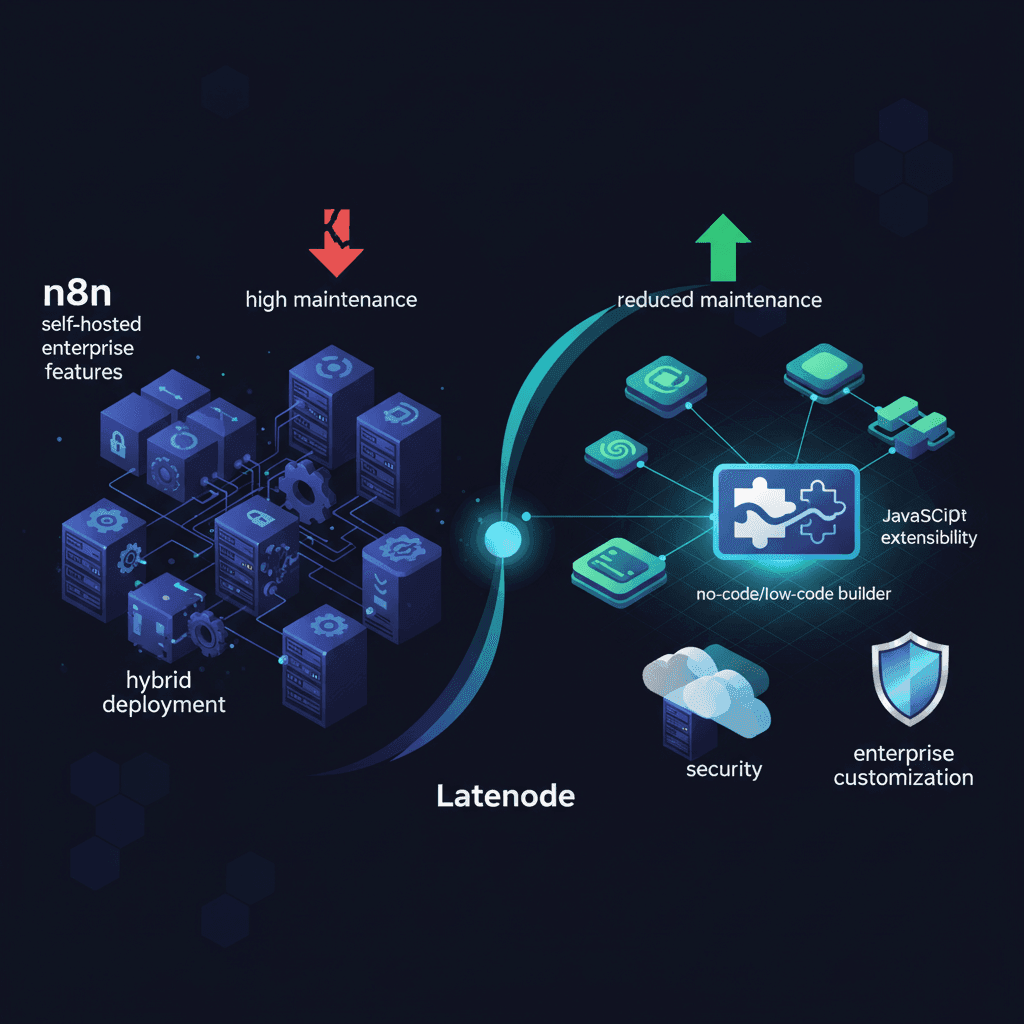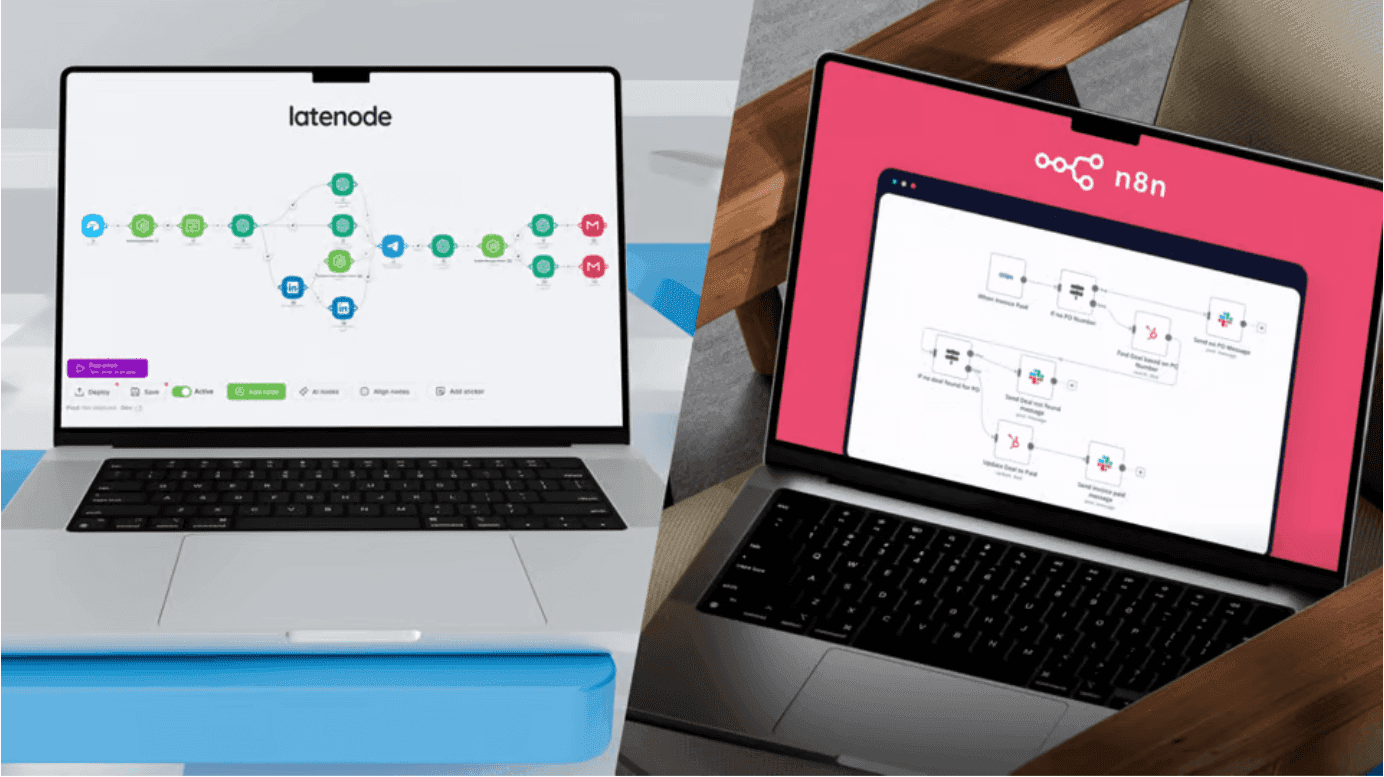Latenode vs. n8n Self-Hosted: Smarter Enterprise AI Automation
Compare Latenode vs n8n self-hosted for enterprise AI automation. Latenode includes 400+ AI models, reduces setup complexity by 80%, and saves $40-60/month on API costs.

The demand for robust, private, and powerful enterprise AI automation is skyrocketing, but so are the complexities of managing self-hosted solutions. Platforms like n8n offer incredible flexibility and control, which is why they're often praised for LLM-based workflow automation in privacy-sensitive environments. A recent real-world example demonstrates this power: a law firm implemented a sophisticated $35,000 AI system using n8n as the integration backbone, connecting LLaMA 3, ChromaDB, and other components into a modular, privacy-focused legal analyst. However, this power comes at a steep operational cost that requires technical expertise to manage complex infrastructure stacks.
Latenode emerges as a transformative, AI-native automation platform that addresses the core automation paradox—the fear of sacrificing flexibility for speed. It offers enterprise-grade control and customization without the traditional self-hosting overhead, providing both convenience and control through its unique hybrid approach. This article breaks down how Latenode's no-code/low-code builder, deep JavaScript extensibility, and managed infrastructure directly address the pain points of scaling a self-hosted n8n instance for enterprise needs.
The Promise and Pain of Self-Hosted Enterprise Features
For enterprises, self-hosted automation solutions present a compelling proposition: total control over data, infrastructure, and customization. This flexibility is critical for organizations that, as described in one real-world project, need absolute "control, privacy and automation" and cannot rely on third-party APIs. Enterprise-grade features expected from a self-hosted instance typically include user management with SSO, granular access controls, audit logging, and custom scalability mechanisms.
These capabilities allow businesses to build modular and flexible systems that can act as the "glue" for complex tech stacks. However, real user feedback from the community reveals significant frustrations with premium feature restrictions and the resource intensity of self-hosting. Users report challenges with operational overhead and feature gating issues that enterprises face when trying to scale their automation initiatives.
The technical process to upgrade from a community to an enterprise version involves deep configuration complexity. Cost comparisons reveal that while self-hosting may seem cheaper initially, the time and expertise required often offset savings, highlighting frustrations around complexity and cost at scale, especially for those running hundreds of automations. This is the core trade-off: powerful control in exchange for significant operational overhead. Want to see what others are saying? Join the community discussion and see what others are saying about the Latenode vs. alternative choice.
Operational Overhead: The Hidden Costs of Self-Hosted Enterprise Automation
The "full control" promised by self-hosting comes with hidden costs that drain resources and shift focus from innovation to infrastructure management. The reality of a production-ready setup reveals the true weight of this operational burden. Community discussions on self-hosting versus VPS deployment highlight the cost, performance, and maintenance trade-offs that enterprises must navigate.
Infrastructure Management: Deploying a self-hosted instance requires dedicated IT expertise for server provisioning, network configuration, database management, and implementing high-availability setups. This isn't a "set it and forget it" task; it's a continuous resource drain on technical teams who could be focused on other strategic initiatives.
Maintenance & Updates: The responsibility for security patches, dependency management, and version updates falls squarely on your team. This constant cycle of maintenance is not only time-consuming but also introduces the risk of errors that can bring critical business automations to a halt.
Security & Compliance: When you self-host, you are solely responsible for securing your environment and meeting compliance standards like GDPR or HIPAA. This includes implementing data encryption (at rest and in transit), setting up disaster recovery plans, and ensuring data residency requirements are met—a high-stakes and resource-intensive endeavor.
Developer Dependency: While platforms allow for customization, complex workflows and custom integrations often require skilled developers. Community evaluations highlight challenges with managing multiple AI API keys and the steep learning curve, creating a bottleneck where business teams are dependent on a small group of experts to build, troubleshoot, and extend automations, slowing down the pace of innovation.
Latenode's Transformation: Simplifying Enterprise Control and Scalability
Latenode revolutionizes enterprise AI automation by delivering robust control and scalability without the crippling overhead of traditional self-hosting. According to comprehensive platform comparisons, Latenode's execution-time pricing model offers up to 90% savings compared to traditional per-operation pricing, making it a budget-friendly choice for enterprises. It abstracts away the complexity, allowing teams to focus on building value, not managing servers. This approach directly addresses the "automation paradox"—the fear of sacrificing flexibility for speed—by providing both.
No-Code/Low-Code Builder for Accessibility: Latenode's visual drag-and-drop interface empowers both technical and non-technical users to build sophisticated, multi-step AI workflows. Implementation guides show that Latenode's user-friendly visual workflows reduce deployment complexity by 80%, enabling businesses to implement AI solutions in weeks rather than months, accelerating time-to-value. This reduces the dependency on specialized developers and democratizes automation, allowing business units to build and adapt their own processes. See how Latenode's no-code builder and advanced AI integrations work in harmony. Watch this deep-dive demonstration.
JavaScript Extensibility for Customization: For developers who need unlimited flexibility, Latenode provides an escape hatch that addresses the core concern that no-code tools are insufficient for serious, enterprise-grade tasks. Specific nodes allow for custom JavaScript, offering the deep customization freedom of a self-hosted solution within a managed environment. This means you never hit a "black box" limitation; you can always write custom code to handle advanced logic or proprietary integrations, directly countering skepticism about no-code platforms being "useless" for complex tasks. Curious about JavaScript extensibility? Learn how you can create your own custom nodes on Latenode to build a reusable toolkit for any scenario.
Unified AI Model Access: Latenode offers unified access to over 400 top AI models (like OpenAI, Claude, and Deepseek) under a single subscription. This eliminates the massive overhead of managing dozens of individual API keys, subscriptions, and billing cycles that users struggle with in self-hosted environments, simplifying AI integration for enterprise-wide use.
AI Copilot: Bridging the Knowledge Gap
Latenode's AI Copilot feature acts as a "senior assistant," helping users write and debug JavaScript, configure complex nodes, and bridge the knowledge gap between business requirements and technical implementation. This directly challenges the notion that automation requires "senior level" experience by providing intelligent guidance that makes advanced automation accessible without requiring years of expertise.
Hybrid Deployment & Managed Security
Latenode delivers the best of both worlds: the security and control benefits traditionally associated with self-hosting, combined with the convenience of a managed SaaS platform. This "hybrid" approach, as detailed in Latenode's checklist for self-hosting, offers full data control with the flexibility of custom code. The platform is designed with robust security features and real-time monitoring, which significantly reduces the burden on internal IT teams. Critical platform updates and security patches are managed by Latenode, ensuring your workflows are always running on the latest and most secure version without requiring your team's intervention.
Reduced Maintenance, Enhanced Focus
By abstracting away infrastructure management, Latenode drastically cuts down on the maintenance and update burdens inherent in a self-hosted environment. This frees up countless hours for your IT and development teams. Instead of spending time patching servers or debugging deployment issues, they can focus on what truly matters: designing and implementing intelligent AI workflows that drive business outcomes and create a competitive advantage.
Beyond Comparison: Latenode's Edge in Customization and Security
Latenode's design philosophy goes beyond simply matching the features of self-hosted solutions; it aims to provide superior customization and security by design, giving enterprises a distinct advantage. Detailed reviews highlight unique features such as multi-trigger workflows, built-in text translation and summarization, and advanced scheduling options that enhance the platform's flexibility and usability for complex enterprise automation tasks.
Tailored Customization with Code: JavaScript extensibility isn't just an add-on; it's a core feature. It allows developers to craft bespoke business logic, integrate with proprietary legacy systems, and build unique AI-driven solutions that are impossible with purely no-code platforms. This directly counters the skepticism that no-code tools are "useless" for complex tasks, by providing "full-code power" when you need it, ensuring you maintain a clear mental model of how your business processes work rather than operating within a "black box."
Limitless Integrations: Beyond ready-made nodes for hundreds of popular apps like Notion, Slack, and HubSpot, Latenode allows users to create custom integrations using HTTP requests and webhooks, ensuring you can connect to any service with an API. Latenode's white-label integration layer enables AI agents to connect with over 600 corporate platforms, transforming them into true acting AI employees and accelerating go-to-market strategies for enterprise adoption.
Advanced AI Customization with RAG: Latenode features built-in Retrieval-Augmented Generation (RAG) capabilities. This allows enterprises to turn their internal documents and files into a secure knowledge base. Your AI agents can then consult this private data to provide context-aware, accurate responses, creating truly intelligent automation for enterprise-specific tasks.
Autonomous AI Teams: Latenode's AI teams feature allows for multi-agent collaboration without the need for complex microservice orchestration, simplifying deployment and reducing operational overhead. You can build "autonomous AI teams" or multi-agent systems where different AI agents collaborate to automate entire end-to-end business processes. Imagine one agent analyzing incoming data, a second drafting a response, and a third updating the CRM—all working in concert. This is the future of customized business process automation, a field where Latenode excels.
Enterprise-Grade Security by Design: Latenode manages platform security proactively, offering robust access controls, data isolation, and compliance support. This managed approach removes the immense pressure on your team to be security experts, providing a secure foundation upon which you can build with confidence. For the latest on new security and AI features, follow us on LinkedIn.
Real-World Enterprise Applications
The comparison analysis shows that while self-hosted solutions suit tech-savvy users who can manage their own infrastructure, Latenode offers easier scalability and managed plans for less technical users, making it particularly valuable for enterprise environments where rapid deployment and reduced maintenance overhead are critical. Enterprise case studies demonstrate how Latenode's no-code interface allows teams to build complex automations without coding knowledge, empowering organizations to streamline operations and enhance productivity across departments.
Recent research on "LADs: Leveraging LLMs for AI-Driven DevOps" introduces frameworks that utilize Large Language Models to automate cloud configuration and deployment, enhancing adaptability and efficiency in cloud management—capabilities that align perfectly with Latenode's AI-driven automation approach for enterprise environments.
Conclusion
The core challenge for modern enterprises is clear: how to gain the power and control of enterprise automation without getting bogged down by operational complexity. While self-hosting offers immense flexibility, it comes at the cost of significant infrastructure management, maintenance, and security burdens that often offset initial cost savings.
Latenode offers a smarter path forward, as evidenced by official comparisons that highlight pricing advantages and execution cost metrics alongside superior AI agent capabilities. It provides enterprise-grade flexibility and control through a powerful combination of a no-code/low-code builder, deep JavaScript extensibility, and unified access to over 400 AI models. By pairing this with a managed, secure, and scalable "hybrid" environment, Latenode removes the self-hosting overhead entirely while maintaining the transparency and control that enterprises demand. This enables businesses to stop managing infrastructure and start building sophisticated, secure, and highly customized AI-native workflows that deliver real business value, turning the chaos of disparate systems into integrated, automated solutions. See why enterprise teams are making the switch by reading our reviews on G2.
Ready to build powerful AI automations without the overhead? Get started with Latenode for free.



